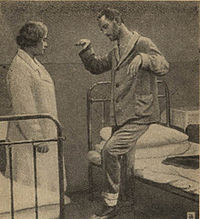
Uniparental Disomy Causing Myoclonus Dystonia Associated with Russell Silver Syndrome
Sign Up to like & getrecommendations! Published in 2019 at "Movement Disorders Clinical Practice"
DOI: 10.1002/mdc3.12768
Abstract: Myoclonus dystonia (MD) is a rare movement disorder characterized by alcohol-responsive myoclonic jerks, dystonia, and psychiatric complaints, which is often associated with an autosomal-dominant pathogenic variant (mutation) in the epsilon-sarcoglycan gene (SGCE), located on chromosome… read more here.
Keywords: uniparental disomy; mupd7; silver syndrome; russell silver ... See more keywords

Low CSF 5‐HIAA in Myoclonus Dystonia
Sign Up to like & getrecommendations! Published in 2017 at "Movement Disorders"
DOI: 10.1002/mds.27117
Abstract: Myoclonus Dystonia (MD; DYT11) is an early-onset hyperkinetic movement disorder with a prominent psychiatric phenotype caused by mutations in the E-sarcoglycan (SGCE) gene. Although its precise function is unknown, multiple studies suggest E-sarcoglycan to be… read more here.
Keywords: dystonia; myoclonus dystonia; csf hiaa; hiaa myoclonus ... See more keywords

Natural Course of Myoclonus‐Dystonia in Adulthood: Stable Motor Signs But Increased Psychiatry
Sign Up to like & getrecommendations! Published in 2020 at "Movement Disorders"
DOI: 10.1002/mds.28033
Abstract: Myoclonus‐dystonia (M‐D) is a rare hyperkinetic movement disorder characterized by upper body–predominant myoclonus and dystonia.1 A large proportion of cases are caused by autosomal‐dominant inherited mutations in the SGCE gene. In addition to the motor… read more here.
Keywords: motor; natural course; course myoclonus; myoclonus dystonia ... See more keywords

Mutation in ε-Sarcoglycan Induces a Myoclonus-Dystonia Syndrome-Like Movement Disorder in Mice.
Sign Up to like & getrecommendations! Published in 2020 at "Neuroscience bulletin"
DOI: 10.1007/s12264-020-00612-5
Abstract: Myoclonus dystonia syndrome (MDS) is an inherited movement disorder, and most MDS-related mutations have so far been found in the ε-sarcoglycan (SGCE) coding gene. By generating SGCE-knockout (KO) and human 237 C > T mutation knock-in (KI)… read more here.
Keywords: movement; dystonia syndrome; movement disorder; mds ... See more keywords

A Case Report of Myoclonus-Dystonia with Isolated Myoclonus Phenotype and Novel Mutation Successfully Treated with Deep Brain Stimulation
Sign Up to like & getrecommendations! Published in 2020 at "Neurology and Therapy"
DOI: 10.1007/s40120-020-00186-4
Abstract: Introduction Myoclonus-dystonia is an inherited disorder characterized by a combination of myoclonic jerks and dystonia. Mutations in the epsilon-sarcoglycan gene ( SGCE ) represent the main known genetic cause. In the last few years, deep… read more here.
Keywords: case; isolated myoclonus; myoclonus; myoclonus phenotype ... See more keywords

Deep brain stimulation for myoclonus-dystonia syndrome with double mutations in DYT1 and DYT11
Sign Up to like & getrecommendations! Published in 2017 at "Scientific Reports"
DOI: 10.1038/srep41042
Abstract: Myoclonus-dystonia syndrome (MDS) is a rare autosomal dominant inherited disorder characterized by the presentation of both myoclonic jerks and dystonia. Evidence is emerging that deep brain stimulation (DBS) may be a promising treatment for MDS.… read more here.
Keywords: dyt1 dyt11; dystonia syndrome; dbs; mds ... See more keywords

Epileptic Encephalopathy, Myoclonus-Dystonia, and Premature Pubarche in Siblings with a Novel C-Terminal Truncating Mutation in ATRX Gene.
Sign Up to like & getrecommendations! Published in 2019 at "Neuropediatrics"
DOI: 10.1055/s-0039-1692141
Abstract: The X-linked alpha thalassemia mental retardation (ATR-X) syndrome is a genetic disorder caused by X-linked recessive mutations in ATRX gene, related to a wide spectrum of clinical manifestations, such as alpha thalassemia, developmental delay, genital… read more here.
Keywords: atrx gene; epileptic encephalopathy; atr syndrome; myoclonus dystonia ... See more keywords

Cortical neuronal hyperexcitability and synaptic changes in SGCE mutation-positive myoclonus dystonia
Sign Up to like & getrecommendations! Published in 2022 at "Brain"
DOI: 10.1093/brain/awac365
Abstract: Abstract Myoclonus dystonia is a childhood-onset hyperkinetic movement disorder with a combined motor and psychiatric phenotype. It represents one of the few autosomal dominant inherited dystonic disorders and is caused by mutations in the ε-sarcoglycan… read more here.
Keywords: mutation; cortical neuronal; sgce mutation; myoclonus dystonia ... See more keywords

Loss‐of‐function mutations in SGCE found in Japanese patients with myoclonus‐dystonia
Sign Up to like & getrecommendations! Published in 2022 at "Clinical Genetics"
DOI: 10.1111/cge.14233
Abstract: SGCE myoclonus‐dystonia is a monogenic form of dystonia with an autosomal dominant mode of inheritance that co‐occurs with a myoclonic jerk. In this study, we present 12 Japanese patients from nine families with this disease.… read more here.
Keywords: mutations sgce; function mutations; loss function; japanese patients ... See more keywords

Early identification of children with myoclonus‐dystonia: Is it time for a revision of diagnostic criteria?
Sign Up to like & getrecommendations! Published in 2022 at "Developmental Medicine and Child Neurology"
DOI: 10.1111/dmcn.15310
Abstract: This commentary is on the original article by Correa‐Vela et al. on pages 207‐214 of this issue. read more here.
Keywords: identification children; children myoclonus; time revision; myoclonus dystonia ... See more keywords

Child Neurology: Myoclonus-dystonia in Russell-Silver Syndrome
Sign Up to like & getrecommendations! Published in 2020 at "Neurology"
DOI: 10.1212/wnl.0000000000010076
Abstract: A 14-year-old girl presented to our pediatric neurology clinic with complaints of hand jerks noticed since age 6. The girl reported jerky hand movements that became more severe with time and interfered with daily tasks,… read more here.
Keywords: dystonia russell; child neurology; myoclonus dystonia; russell silver ... See more keywords